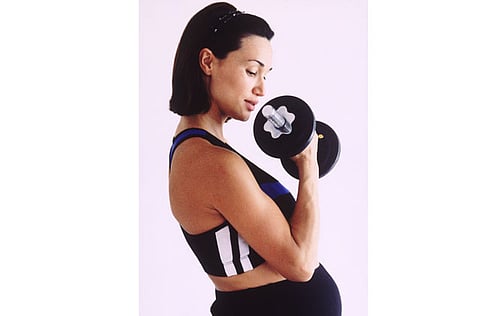Great expectations
Stay fit and look fabulous even when you are pregnant. Experts recommend exercises for that healthy glow

I never realised what a controversy prenatal exercise was, especially in the UAE, until I became pregnant earlier this year. The opinions — from mums-to-be, seasoned matriarchs, to family, friends, and even medical practitioners — ran rampant when my pregnancy was announced, ranging from moving as little as possible to light exercise, including walking, swimming, prenatal yoga and Pilates.
As someone who kept in relatively good shape with regular high-intensity workouts, these recommendations were clearly not what I wanted to hear. Combined with the fact that A-list mums-to-be in T-town were packing on the pounds and being vilified in the process, (remember Jessica Simpson and Aishwarya Rai Bachchan?), made me, at seven weeks of pregnancy, determined to find a way to maintain a trim figure without endangering the little bun in the oven.
Working out
Enter Angelica Horvatic, UK -trained personal trainer and well-being authority in Dubai, and a specialist in prenatal and postnatal health. She has coached more than 100 pregnant women in the UAE, and almost double that number of new mothers. Through an extensive search I managed to find her details and immediately felt at ease when I asked her — ‘Can I still go running?’ To which, she answered yes, stressing that medium to high intensity workouts were fine, so long as you listen to your own body and don’t overexert yourself. Almost three trimesters later, I can confirm that my weight increase is in check, mobility and flexibility have increased, and that enviable preggo silhouette has successfully followed me to 36 weeks.
Based on a recent study conducted by John Hopkins University in Baltimore, healthy women in their third trimester who exercised for more than 30 minutes on a treadmill, had no problems with fetal well-being. Before and after each session, researchers used a Doppler ultrasound to measure the foetus’ heart rate and found that medium- and high-intensity workouts did not stop the baby from receiving enough blood or oxygen, as the heart rate and biophysical profile remained in the normal stage.
The talk test
Dr Nicola Deamer, Medical Director at Healthbay Clinic in Mirdif, says: “Women who exercised regularly prior to pregnancy should continue with their usual cardiovascular regime, but also be aware that as pregnancy increases the cardiac output by up to 40 per cent, their exercise tolerance and capabilities will reduce. A useful tool is the talk test — you should be able to hold a conversation while exercising.”
The benefits of exercise are clearly documented. Not only do you feel better emotionally by releasing endorphins (naturally occurring chemicals in your brain that cause an analgesic effect), but it helps relieve backaches and improves posture, reduces constipation, and prevents wear and tear on muscle joints, a common occurrence as they become loosened during this period due to hormonal changes. You also look better as the exercise increases the blood flow to the skin, giving that ‘healthy glow’ often associated with pregnancy. It prepares women’s bodies for birth, thereby easing labour and delivery, and regaining the pre pregnancy body becomes easier and faster. Shabnam Khericha, mother of a one-and-a-half-year-old girl, who trained with Horvatic more than two years ago in Dubai, recalls that exercise increased her energy levels so much that she continued to work full time up until five days before delivery. “After giving birth, it was much easier to get back into an intense fitness regime and drop the pregnancy weight.”
“The key lies in understanding your fitness level,” says Horvatic, adding, “if you haven’t worked out before, then gradual steps are in order, but if you have a good level of fitness, there’s no reason why you shouldn’t continue with your normal routine, with a few rules — longer warm-ups and cool downs, absolutely no interval training, avoiding jerky movements and maintaining a steady heart rate.”
Last year, Reuters ran a story about Amber Miller, a 27-year-old from Chicago who, at 39 weeks, ran the Chicago marathon, crossed the finished line and later that evening gave birth. While this might be too ambitious for many of us, it is reassuring to know that the opportunity exists in Dubai to treat pregnancy and exercise, nothing other than a typical day at the gym. n


